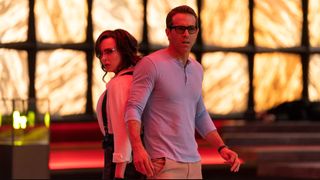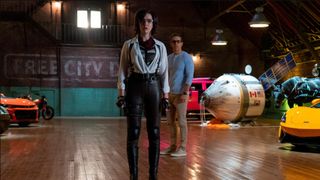Free Guy is a better videogame movie than I expected
In 2021, there isn't a celebrity cameo more prescient than Pokimane.

Ninja plays a bigger role in Free Guy than I was expecting. The new Ryan Reynolds comedy, which is currently sizzling away at the box office, uses a variety of popular streamers and YouTubers as a quasi Greek chorus, like the singers who set up the backstory in Disney's Hercules.
The story follows an NPC named BlueShirtGuy who has inexplicably developed full sentience within an extremely nihilistic GTA Online-like videogame called Free City. BlueShirtGuy quickly becomes a legend on the server, which is populated by the likes of Pokimane, Jacksepticeye, and Ninja. They are filmed in the exact same way they appear on Twitch: ensconced by insulation foam and whirring neon gizmos, offering their thoughts on the NPC Who Learned To Love.
Free Guy has other celebrity cameos, but the streamers are, by far, the most prominent. It is the first movie produced in the insurgent new realities of youth in the 2020s—a culture where the gamers are the torchbearers.
If you are looking for a critical take here, let me tell you that Free Guy is better than I expected it to be. The film is kneecapped in all sorts of bad habits—constant lowest-common-denominator transmedia references, uncanny Hollywood-gamer verbiage, a whole lot of epic bacon-style Ryan Reynolds humor—but the central conceit, in which an NPC suddenly becomes brutally aware of the unfairness of his existence, is leveraged with care.
There are plenty of moments where Free Guy creaks and seizes as it attempts to translate base-level mechanical jargon to the masses (there is an expositional sequence that defines what a "non-playable character" is that made me want to die). But elsewhere, Free Guy is far more trenchant with its precepts. In one dramatic payoff, Guy discovers a "kiss" emote that does not exist within the player's user interface, like an AI finally taking the reins for himself.
It's a movie with all sorts of fun, Matrix-y mini-mindblowers, reveling in all the implications of a San Andreas citizen who's miraculously become self-aware. But, as someone who works around the industry, I found myself most engaged with Free Guy for the way it reveals Disney's perspective on gaming culture as a whole.

Free City itself appears as a freemium open-world hellscape.
Soonami, the fictional studio behind Free City, is headed by a vindictive hypebeast played by Taika Waititi who wishes to dispossess all of his loyal players with the release of Free City 2, which will eradicate the original Free City upon release. This comes to a head in a bit of dialogue where Waititi makes it clear that he will continue to crank out bloodless sequels rather than break ground on something more experimental—a tension that dates back to the earliest PC Gamer back issues—much to the chagrin of his loyal, goodhearted coders.
The biggest gaming news, reviews and hardware deals
Keep up to date with the most important stories and the best deals, as picked by the PC Gamer team.
Our IRL protagonists consist of a pair of gamedevs who emerged out of the indie scene in the Pacific Northwest. Yes, this is a big-budget action movie that uses indie games as a core plot point, specifically as a way to contrast away from the predatory inclinations of Soonami. (Though perhaps a trend is emerging in Hollywood; the recent Space Jam sequel features LeBron James' son building an indie game of his own.)
Free City itself appears as a freemium open-world hellscape; there are rare skins, interminable level thresholds, and microtransactions abound, further proof that for most of America in 2021, the archetypical videogame is a servile loot grind with no end in sight. I'm curious if this is the perspective a lot of parents have about the dominant sector in gaming right now, as these garish, gacha-like contraptions lay siege to middle schools, extracting as many $4.99 payments as they can.
What's especially funny is that Free Guy seems to take place in a world where videogames have solidified as the true, overwhelming monoculture. There are portions of this screenplay where the goings-on in Free City are breathlessly covered by Good Morning America; at one point a livestream of in-game footage occupies the titantrons of New York City. It's funny to think how that sort of premise would seem completely alien only 10 years ago, when this hobby was still treated like a remote niche. I mean, it's still outlandish now—FOX News isn't going to be covering Fortnite seasons anytime soon—but in a world where Ninja gets invited to the Tonight Show and the YouTubers have invaded the Disney Channel, Free Guy is a lot more pertinent. Maybe someday in the near future, an insurrectionist in Grand Theft Auto will be international news.
The movie ends on a slightly warmed-over moralistic tone. It imagines a world where gamers no longer wish to indiscriminately mow down NPCs, and would prefer to occupy a metropolis that isn't constantly torn apart by bank robberies, murders, and car chases. Free Guy doesn't conclude with a 1990s finger-wag at videogame violence, but it's noteworthy that it depicts a gaming world that finds peace through love and friendship.
If videogames have become big enough to demand their own multi-million dollar film adaptations, perhaps Free Guy is onto something when it asks the EAs of the world for a little more creativity and sensitivity as they flesh out their next shooter. But whatever man. Free Guy 2 is already in the works. We all eventually serve the master.

Luke Winkie is a freelance journalist and contributor to many publications, including PC Gamer, The New York Times, Gawker, Slate, and Mel Magazine. In between bouts of writing about Hearthstone, World of Warcraft and Twitch culture here on PC Gamer, Luke also publishes the newsletter On Posting. As a self-described "chronic poster," Luke has "spent hours deep-scrolling through surreptitious Likes tabs to uncover the root of intra-publication beef and broken down quote-tweet animosity like it’s Super Bowl tape." When he graduated from journalism school, he had no idea how bad it was going to get.
Most Popular


